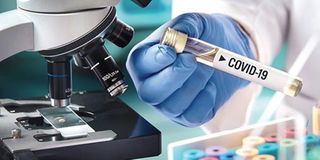Government procures 500,000 corona testing kits

What you need to know:
- The GeneXpert machines were primarily given to hospitals to diagnose tuberculosis.
The Ministry of Health has said they have ordered more than 500,000 kits for testing coronavirus, and part of the consignment will arrive in a week’s time.
The revelation comes a day after Uganda Virus Research Institute (UVRI) said they had a shortage of the kits.
Dr Diana Atwine, the permanent secretary of the Health ministry, told Daily Monitor yesterday that they were also lobbying partners to get the kits as soon as possible.
“We have money but the issue is accessibility. We have ordered more than 500,000 test kits. Every money we get, we put on testing kits because it is a very critical area to us. The manufacturers are very few,” Dr Atwine said.
Citing the order they made in February, which has not yet arrived, the PS said the high global demand for the kits continues to be a big challenge.
Dr Atwine said the test kits are often bought centrally and UVRI gets from the ministry directly as opposed to the institute buying on their own.
The country is looking to diversify means of testing beyond the use of PCR machines, including Genexpert machines and serological tests.
The GeneXpert machines were primarily given to hospitals to diagnose tuberculosis.
They can detect the presence of bacteria and virus in different samples.
Dr Atwine said the country has 200 Genexpert machines in hospitals but added that they need cartridges for coronavirus tests. The country has 15,000 GeneXpert cartridges.
“The one [cartridges] we got we received because global fund is the one that lobbied for us at international level. It is the one we have ordered over and again,” Dr Atwine said.
“If we had the cartridges, we could not be suffering to transport the samples from Arua to Kampala. We have the machines, experts and approvals for the laboratories to run the tests,” she added.
GeneXpert cartridges is where the sample to be tested for coronavirus is placed before the test is run.
Meanwhile, experts have called for increased efficiency in testing the population by hundred to thousand times above the current rate before relaxing the lockdown.
They say if the lockdown is lifted, requirement for testing will shoot exponentially because it will be hard to tell whether someone is the source of the infection or contact.
Prof Moses Joloba from Makerere University said the country should seek sustainable solutions in testing.
“Some products have known technology, if they had bought machines to manufacture the kits, we could be manufacturing and selling the rest to other countries,” he said.
Prof Joloba said besides having reagents that can run 10,000 PCR tests for coronavirus, they were also evaluating rapid diagnostic kits they got.
“As Africa, we are in double hit with the problem [of Coivid-19] because we are not even high burdened like those countries where the kits are manufactured,” he said.
He said all countries relaxing lockdown must increase testing by hundred to thousand times, adding: “Any step of easing the lockdown without capability of testing more people is a risk.”
“If we relax the lockdown, our test requirement will shoot exponentially because we shall not be able to tell whether someone is a source or contact so we need to test anyone who needs to be tested so we don’t need to frustrate them,” he added.




